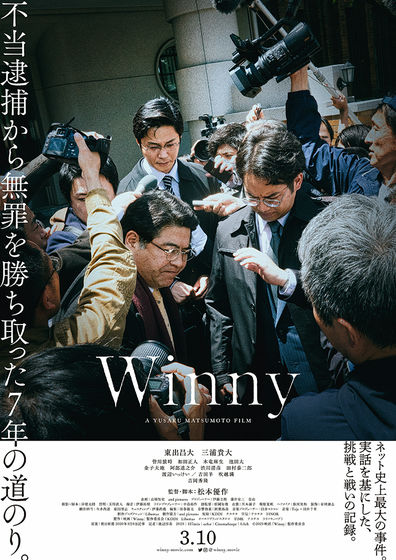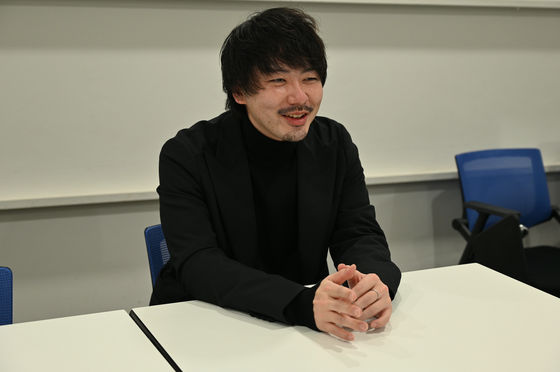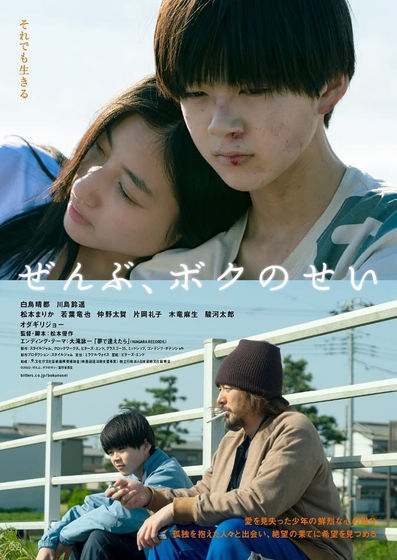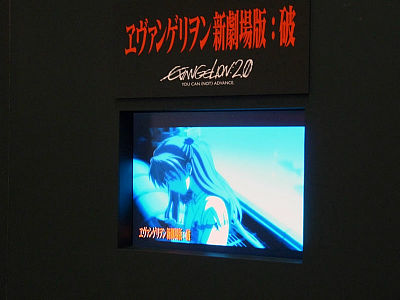Interview with Yusaku Matsumoto, director of the movie 'Winny,' depicting Isamu Kaneko, the developer who created that file sharing software.

The movie ``
Movie “Winny” | Official website
https://winny-movie.com/
Masahiro Higashide plays Mr. Kaneko, and Takahiro Miura plays lawyer Toshimitsu Dan.

Director Yusaku Matsumoto

GIGAZINE (hereinafter referred to as G):
There was a tweet on the official Twitter
Director Yusaku Matsumoto (hereinafter referred to as Matsumoto):
I'm using the real thing that Mr. Kaneko used.
G:
Oh, it's real after all.
Matsumoto:
Only the lenses have been changed to match Mr. Higashide's, but the frame is exactly Mr. Kaneko's. Your watch and camera are also yours. The clock wasn't working at first because it was broken, but after Mr. Higashide visited Mr. Kaneko's grave, it suddenly started working. This really surprised me. Also, there are quite a few science magazines that appear in the movie, but those are also his own.
G:
When I saw a pile of books, I thought to myself, ``They're making it look real... maybe they're real?''
Matsumoto:
We also prepared a PC model from that time. Producer Fujii and other members of the production department worked very hard to purchase things we didn't have at auction.
G:
What is the reason for using the real thing?
Matsumoto:
I think that for actors, using authentic items from the time has a big impact on the play. That's the biggest thing. There are some footage of Mr. Kaneko after he was acquitted, but there aren't that many. When that happens, I think Mr. Higashide needs some clues for playing the role of Mr. Kaneko. By looking at his handwritten notes, I wanted him to be able to think about his personality from the way he writes, and to incorporate as many of those hints and materials into his own plays as possible. I thought it would be completely different if there was a real thing and if it wasn't.

G:
I see.
Matsumoto:
Also, I think the way the movie looks is that it feels like it's official, and it helps convince people that the movie was made with the consent of the bereaved family. There are many movies like this based on true stories, including those from overseas, but some are good and some are bad, and some of them seem like they were forced to make something. For example, they may draw something that suits their convenience without obtaining the consent of the bereaved family. I think there's no point in making it if we do something like that, and I want it to be an official work.
G:
On the official Twitter account for this film, there were several tweets titled 'Interview with Director Yusaku Matsumoto,' and one of them mentioned that there was originally a script for a different project. The director said that if he were to do it, he would like to write a script from scratch that dealt with the incident head-on, but what was the first script like?
◤Movie “Winny”◢
— The movie “Winny” is now showing in theaters nationwide! ! (@winny_movie) February 4, 2023
Nationwide release on March 10th????
⚫️Winny production secret story⚫️
✎???? Director Yusaku Matsumoto Interview ① pic.twitter.com/VzJ9p5IGfN
Matsumoto:
This is an excerpt from the official interview published in the pamphlet. The first script I was shown was a modern drama starring a ``film director who tries to turn the Winny incident into a movie.'' The story was about researching and depicting the Winny incident in the present day, but since it was still in its first draft, the story was mostly about stories that would come up if you looked them up on the internet. I wondered if it would be interesting if it were made into a movie.
G:
Hmmm.
Matsumoto:
If I were to make a movie, I would want to tackle the Winny incident head-on, and make it a movie that even covers parts of the movie that you wouldn't be able to figure out even if you looked it up on the internet. So, I forgot about the script and started researching and writing the script from scratch.
G:
The director has given interviews for other works, and said that his method was to write a quick plot first and then work out the details, but how was this work made? mosquito?
Matsumoto:
In the case of this work, I started by learning about the seven-year trial. So, I went to see the lawyer at the time, listened to his story, borrowed court documents, and read the records. So I didn't write the plot until much later. First, I researched everything, learned about the events and trials at the time, and wrote down the events in a chronology, saying, ``This happened here.'' I think what took the most time was thinking about what to depict and how to make it work as a movie.
G:
How long did it actually take to complete the script?
Matsumoto:
I was writing while filming, so it probably took about four years.
G:
Does that mean that when you watch him act, you rewrite it and say, ``This might be better?''
Matsumoto:
When making this film, I was able to meet Kaneko's older sister at the last minute before filming. So I asked Mr. Kaneko about various things, but there were some parts that I couldn't get through, so I had him actually come to the set and see Mr. Kaneko, played by Mr. Higashide, and I asked him what he remembered from that time. I did it. Sometimes things that wouldn't come out in a more formal interview format came out, or things that the person himself didn't think were that important turned out to be a big clue for us, so while I was shooting and reporting at the same time, There were times when I felt like I was moving forward.
G:
I see.
Matsumoto:
By Mr. Higashide becoming Mr. Kaneko, we can see that ``If Mr. Kaneko were Mr. Kaneko, this is what he would say or do.'' There are videos of the trial, but I wonder what he did in his alone time. I was constantly rewriting the script.
G:
Regarding Mr. Kaneko's sister, there was a tweet saying that she came to the set on the first day of filming and cried when she saw Mr. Higashide, and when the director saw that, he felt, ``This is okay.'' Ta.
◤Movie “Winny”◢
— The movie “Winny” is now showing in theaters nationwide! ! (@winny_movie) February 10, 2023
Nationwide release on March 10th????
⚫️Winny production secret story⚫️
✎???? Director Yusaku Matsumoto Interview ⑦ pic.twitter.com/ltZdWy0IDZ
Matsumoto:
I had a hard time grasping the image of Mr. Kaneko, and I wasn't sure. I've never met Mr. Kaneko before, so I've been talking to people I've met before making this work, but I can't seem to find anything to base it on. So, when we were filming, I asked for a cut and the first thing I saw was the older sister. If the older sister had a satisfied look on her face, she would have turned out to be Mr. Kaneko. At first, I was searching and searching like that. Then, my sister said, ``It reminded me of those days,'' and I said, ``In this case, Mr. Kaneko transferred to Mr. Higashide, and he became Mr. Kaneko.'' I was glad that I had a clear outlook at the beginning of the shoot.
G:
By the way, director Matsumoto, what kind of image and knowledge did you have about 'P2P' and 'Winny' before planning this work?
Matsumoto:
I didn't know about Winny myself, but when I thought about it, I remembered that when I was in elementary school, a senior told me that there was something called LimeWire .
G:
LimeWire (lol)
Matsumoto:
Before I knew it, I had stopped using it while listening to music, but in that sense, my past memories came back to me, reminding me that I used to use it too. I didn't upload it, but as a user, it might not have been a good way to use it (lol)
G:
When I think that this movie also includes a video of the movie thief saying, ``Illegal uploading is a crime,'' before the screening, I wonder, ``Will this movie get in?''
Matsumoto:
At the time of the Winny incident, downloading was not illegal, and after that, downloading became illegal depending on the content, but I certainly thought, ``Movie thief, it's flowing'' (lol) There too. I think it's some kind of entertainment. I would also like to go to the movie theater and watch the movie Thief before watching the main story (lol)
G:
When I first heard about this movie, I wondered if this movie about Winny would be shown in theaters instead of streaming.
Matsumoto:
Well, at first I didn't even think it would be possible to show it at a cinema. I think it's very meaningful that these kinds of films are shown at cinemas.
G:
In an interview posted on Twitter, the director said, ``I have to make this movie give you a sense of what has changed and what hasn't changed through the Winny incident.'' What has changed and what hasn't changed?
◤Movie “Winny”◢
— The movie “Winny” is now showing in theaters nationwide! ! (@winny_movie) February 12, 2023
Nationwide release on March 10th????
⚫️Winny production secret story⚫️
✎???? Director Yusaku Matsumoto Interview ⑨ pic.twitter.com/f99OZ97EZL
Matsumoto:
I didn't know anything about trials either. As I studied this through filmmaking, I realized that there were various problems with criminal trials at the time, such as hostage justice and not being able to see your next of kin. Efforts are now underway to record and visualize interrogations, and I think we are making some progress in the right direction, but lawyers say, ``Nothing has changed, and the problems in criminal trials continue.'' I think you feel that there is.
Speaking of things that have changed, when Winny came out, there was no YouTube yet, and there was no iTunes either, so if we had been able to successfully turn it into a business in Japan, something similar to GAFA might have been born around the world. , I think. Napster became a problem in America, but the founder (Sean Parker) was not arrested and became the CEO of Facebook. I think it's a shame that such things are being made all over the world, but Japan is still under the control of other countries, and as was said in the film, ``the nail that sticks out gets hammered down'' hasn't changed. I think it is. I feel like we can use the 'Winny Incident' as a springboard to reexamine our current era. In this day and age, those who receive the media must be especially literate to understand it properly, or rather, they may end up understanding it incorrectly...
I think the Winny incident was the beginning of many things. Personal computers came to my house in the early 2000s, and a lot of things have changed drastically since then, and I think you can get a feel for the atmosphere of that era by watching the movie.
G:
In an interview with the director, he talked with Kentaro Kishi, who taught him how to make independent films, and he mentioned that ``those left behind'' was a common theme. Director Matsumoto has said in the past that when he was a student, a classmate committed suicide, but when did you realize that ``those left behind'' was a theme that you were passionate about? Is it?
◤Movie “Winny”◢
— The movie “Winny” is now showing in theaters nationwide! ! (@winny_movie) February 5, 2023
Nationwide release on March 10th????
⚫️Winny production secret story⚫️
✎???? Director Yusaku Matsumoto Interview ② pic.twitter.com/h6EGFIYqsF
Matsumoto:
When I was making an independent film, I didn't necessarily understand in my head that the theme was 'those left behind.' Mr. Kishi had a similar experience and was making movies with the same enthusiasm. As a result, I have continued to make films with the theme of ``those left behind'' still having to live on, and now that Kaneko has passed away in the Winny incident, I feel that the people left behind must live on. I think that includes us, but how should we live in today's society? At the time, what I was doing with independent films was a bit more narrow-minded, but I feel like I took a slightly broader perspective while still having the same fundamental themes.
G:
In this work, Mr. Kaneko is drinking a lot of orange juice, and this was found out from the testimony of a person who actually visited Mr. Kaneko's room, but in the work, Mr. Kaneko is seen drinking a lot of orange juice. was hardly depicted. How were you able to find that person?
◤Movie “Winny”◢
— The movie “Winny” is now showing in theaters nationwide! ! (@winny_movie) February 9, 2023
Nationwide release on March 10th????
⚫️Winny production secret story⚫️
✎???? Director Yusaku Matsumoto interview ⑥ pic.twitter.com/JcAIGzAKXi
Matsumoto:
In fact, only one lawyer had ever been to Mr. Kaneko's room. There was an electric bed in the middle of the room, a pile of orangina, and the rest was a mess. The rest is your sister's testimony. I wanted to recreate that as much as possible. What kind of PC did you have? The actual PC is currently housed at the University of Tokyo, but the reason I chose that room for the first scene was to have people take a quick look at his room, and see what kind of life he was living and what kind of things he was doing. I think you can convey how alive you are in the space without having to put it into words.

G:
Certainly, the scene in that room was very intense. The resolution of people who live in such an environment is high, or rather the reality is amazing... I was convinced that Winny production was an extension of this room.
Matsumoto:
Basically, the bed arrangement should be the same. We paid particular attention to the details, including the books in the room.
G:
Even the cars running outside seemed to reflect the times.
Matsumoto:
I've researched the era and tried to match it as much as possible. However, there are some scenes that intentionally shift in time, one of which is the scene where Mr. Kaneko is taking a photo with a digital camera, and that digital camera is quite new. It was used by Mr. Kaneko before he passed away, so it seems strange that he used it in that scene as historical evidence, but I did it on purpose. In addition, if there is something that does not match the historical research, there is a possibility that the actual item used by Mr. Kaneko has been found, so I would be happy if you could take a look at that as well.
G:
That's what it was. You mentioned that you first read seven years worth of court documents in order to create the film, but what were your thoughts after actually reading it?
◤Movie “Winny”◢
— The movie “Winny” is now showing in theaters nationwide! ! (@winny_movie) February 8, 2023
Nationwide release on March 10th????
⚫️Winny production secret story⚫️
✎???? Director Yusaku Matsumoto interview ⑤ pic.twitter.com/PZHFWFBSLU
Matsumoto:
I don't know if this is the correct way to describe it, but it was very interesting. It felt like I was reading a novel because I could see everything that Mr. Kaneko was talking about, and what the police and prosecutors were talking about. After reading through it all, I decided to focus on the first instance at the Kyoto District Court, but there was a huge amount of information on that part alone. While deciding where to draw it, I started plotting it little by little. At first, I didn't really pay attention to the two-hour time limit and just put in a lot of content, but it just wouldn't fit, so I thought, ``Maybe I should cut this part.'' At first, there was a scene in which Jun Murai, who was also a witness at the trial, appeared. However, there were some parts that I thought were interesting but didn't make sense as a movie, so I had to make a selection.
G:
They actually had active lawyers perform the mock trial, and actors also participated.
Matsumoto:
We asked the lawyers from that time to gather together, and while reading the materials, we somehow created a place in the conference room that looked like ``this is the judge's seat,'' and first we asked the lawyers to reenact the trial as it happened at the time. Ta. The actors watch it, and then have them take part in the mock trial. Next, we had lawyers look at the trial that we had summarized and dramatized, corrected the parts that were unrealistic or not good, and then asked the actors to come in again. This process was repeated. We set up five or six cameras, including GoPros, in various locations to check the angles during the trial. I thought it had the ``movements of a professional lawyer,'' so I asked the actors to watch it. Personally, I felt like I was studying and researching how to shoot the trial scene.

G:
Oh, I see.
Matsumoto:
In fact, we actually watch the trials that Dan's lawyer conducts to make it as realistic as possible. As for the trial scene, I think it is truly ``the most realistic trial scene in Japan.''
G:
When the lawyer came next to Mr. Kaneko and showed him the documents, the prosecutor was also right next to him. Is that what it was like? I was watching because I thought there would be a lot of pressure.
Matsumoto:
They come to make sure that the materials you are submitting and the materials you are showing match.
G:
I see. Next, I will step away from the work for a moment, but in the stage greeting for ``

Director Yusaku Matsumoto takes the stage! “It’s All My Fault” Release Commemoration Stage Greeting REPORT - YouTube
Matsumoto:
I wonder what I was watching...Hmm, I can't remember the movie right now, but I used to go to Theater Umeda and Cine Libre Umeda a lot when I was a student. Most of the Japanese movies that became a hot topic just about 10 years ago must have been watched on one or the other. And then there's Nana Gay .
G:
Thirteen (lol)
Matsumoto:
Perhaps the most popular one was Cine Libre.
G:
Was it like going to the movie theater and thinking, ``I haven't seen this yet,'' and then watching it?
Matsumoto:
Basically, I went to see the works that I wanted to see. We also did late shows after school. Also, I went to the 10am film festival because students could see it for 500 yen. Umeda was close to my school.
G:
Do you still go to the movie theater often?
Matsumoto:
Nowadays, I'm mainly in Shinjuku, so I tend to go to Theater or Musashinokan . I also go to Cinema Karite , Eurospace ... I usually go there (lol)
G:
Wow, you can call me a movie buff so much that I watch movies.
Matsumoto:
Well, when I meet real cinephiles, I can't really tell them my name (lol) When I was a student, I watched about 200 to 300 movies a year. I also watched it on DVD because it would have cost money to just go to the theater. Even now, there are works that I can't see on streaming, so I go and borrow them just like I would at a library. TSUTAYA in Shibuya is already like a library. TSUTAYA has also lost stores in Kabukicho and Shinjuku, so things are pretty tough.
G:
There are some works that cannot be seen on stream. If I can't find a piece, I rent it from TSUTAYA Discus , but now that I think about it, there are some that I order from the Shibuya store.
Matsumoto:
It would be really bad if Shibuya TSUTAYA disappeared. It's great, because anything is possible.
G:
This is the last question, but there was a comment on the official website that said, ``If Mr. Kaneko had not been arrested, if he was still alive, Japan might have changed greatly today.'' . What do you think would have changed?
Matsumoto:
I also think that it is quite difficult. Even if Mr. Kaneko had not been arrested for the Winny incident, I think the stake would have been driven elsewhere. There is a high possibility that Japan would have changed significantly, but on the other hand, I also think that it would have been crushed somewhere else. Generally speaking, I don't think it can be said that if Mr. Kaneko had not been arrested, the program would have been put to good use in Japanese society and spread around the world.
G:
I see. Thank you for your story.
The movie 'Winny' is being released nationwide from March 10th.
Movie 'Winny' trailer released nationwide on March 10th - YouTube
Related Posts:







